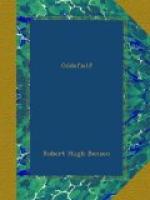We went back again, shutting the door behind us, and sat down. It was a pleasant little parlour this, decently furnished, and I feigned to be looking at the hanging that was over the press where they kept the tankards, as if I had no curiosity in the world.
“Here, Mr. Mallock,” said my friend’s voice behind me. “Look at this.”
He had drawn out a little black pocket-book, leather-bound, and with it three or four loose papers. I sat down by him, and took it from him.
“It is some kind of an account-book,” I said.
“You are right, sir,” said Mr. Rumbald.
He sat with an air of vast importance, while I examined the book. It had a great number of entries, concerning such things as accounts for beer and other refreshments, with others which I could not understand. There were also the names of inns in London, with marks opposite to them, and times of day written down besides. I could make nothing of all this; so I turned to the papers. Here, to my astonishment, on one of them was written a list of names, some very well known, beginning with my Lord Shaftesbury’s, and on the two others a number of notes in short-hand, with three or four of the same names as before written long-hand. One of these slipped to the floor as I held them, and I stooped to pick it up; when I raised my head again, the pocket-book and the other two papers had disappeared again into Mr. Rumbald’s possession. He did not seem to have seen the one that fell, so I held it on my knee beneath the table, thinking to examine it later.
“Well?” I asked. “What is the matter?”
The maltster had an air of great mystery upon his face. He regarded me sternly, though his eyes watered a little.
“Enough to hang us all,” he said; and I saw the fierce light in his eyes again, through the veil of drink.
“Why; how is that?” asked I, slipping the paper I held, behind me, and into the skirt pocket of my coat.
“Those accounts,” he said, “they are all for the procession; for I provided myself a good deal of the refreshment; and was paid for it by a man of my Lord’s, who has signed the book.”
“And the two papers?” I asked.
“Ah!” said Mr. Rumbald. “That is another matter altogether.”
I feigned that I was incurious.
“Well,” I said, “every man to his own trade. I would not meddle with another’s, for the world.”
“That is best,” said my friend.
I tried a sentence or two more; but caution seemed to have returned to him, though a little late; and I presently saw I should get no more out of him. I congratulated him again on the pleasant evening we had spent; and five minutes later we went downstairs together, very friendly; and he winked upon me as I went out, after paying my account, as if there were some secret understanding between us.
* * * * *




